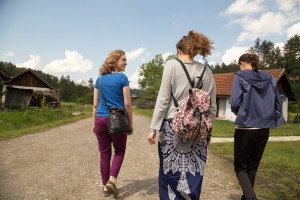 My name is Elske, I’m from the north of Germany and I was one year an EVS volunteer at the Foundation Krila nade (from October 2015 until end of September 2016). After I finished school I went to Scotland to volunteer for 9 months. However, other than planned, I stayed in Scotland for eight years. I did an undergraduate degree in Psychology and then went on to do a M.Sc. in Global Mental Health. Before my EVS I worked in a homeless charity in Glasgow for almost two years. I decided to go to Bosnia-Herzegovina, wanting to learn about the country, the culture and it’s people.
My name is Elske, I’m from the north of Germany and I was one year an EVS volunteer at the Foundation Krila nade (from October 2015 until end of September 2016). After I finished school I went to Scotland to volunteer for 9 months. However, other than planned, I stayed in Scotland for eight years. I did an undergraduate degree in Psychology and then went on to do a M.Sc. in Global Mental Health. Before my EVS I worked in a homeless charity in Glasgow for almost two years. I decided to go to Bosnia-Herzegovina, wanting to learn about the country, the culture and it’s people.
My EVS project covered three main areas: language teaching, mental health and the work on a documentary film. Together with other volunteers, I taught English once a week. I also held a German conversational class twice a week and provided one-to-one language support in German and English language. Preparing the lessons, I learned a lot about how to use games and stories to engage students and how to structure lessons well. It was enjoyable to work with the students and to see their progress. I have continued working as a language tutor after leaving Sarajevo and still benefit from the experience I gained during my year at Wings of Hope.
Together with Belma Ziga, Wings of Hope’s CBT-therapist, I worked on a psycho-educational “CBT-Programme for Violent Behaviour in School Children”. The first stage of the programme involved development of workshop activities adapted from existing CBT-programmes (STEAM Program and the Coping Power Program), that included topics such as: awareness and recognition of emotions, coping with difficult emotions, understanding the impact of difficult behaviour and forming positive relationships with others etc.
In March 2016 we started running workshops at “Osnovna Skola Čengic Vila l”. One particular session has stuck in my mind. Talking about difficult emotions we introduced the children to a character, Tom the octopus, who was living at the bottom of the ocean, feeling angry and lonely and unable to make friends. The children felt compelled to help Tom out of his misery, gave him advice through letters and even suggested to write a song for Tom. Picking up on this idea I wrote a little song about Tom, which then was translated into Bosnian by one other EVS volunteer Almedina. The kids were very excited to sing the song and further developed the lyrics. Being involved in the programme I learned a lot about the development of workshop activities.
Next to the activities planned as part of the EVS, volunteers have the opportunity to work on a personal project. The other EVS volunteers Almedina, Marta and I decided to work on a documentary film portraying the situation of internally displaced people in Bosnia. We started working on the project in Spring 2016. Initially, we contacted NGOs supporting internally displaced people who still live in collective centers. One of these organisations was Snaga Žene. With the help of Snaga Žene, we got in touch with people living in Ježevac and Višža, two collective centers near Tuzla. Through Snaga Žene, we also met women who had returned to their homes close Srebrenica/Potočari, after having been displaced during the war. Making formal arrangements, including the process of getting the ministry’s permission to film at the collective centers took a few months. In July 2016, we were finally able to visit people in Visća, Ježevac, and Srebrenica and to conduct the first interviews. At this point the team had extended to two other team members, Marco, a photographer who was taking pictures and was also filming and Paolo, a former EVS volunteer who was interpreting during the interviews I conducted. The work on the film has continued beyond the EVS. Before starting to work on the project, I didn’t know much about the process of making documentary film. Through Almedina and Marta I had the opportunity to learn about this area of work. The visits at people’s homes, their stories, their hospitality and their openness have left a very strong impression.

 LOKALNI JEZIK
LOKALNI JEZIK